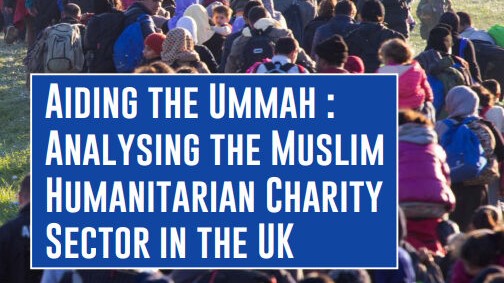The income of UK based Muslim charities in the humanitarian aid sector could be worth just under £4.4bn by 2051, according to research into the sector.
The estimate is based on steady growth in the sector’s finances in recent years, which is predicted to grow markedly over the next three decades.
Researchers found that this sector’s income grew by £192m or 37% between 2017 and 2020. Based on a “conservative income growth rate” of 20% every four years it estimates the sector could be “raising £4.39bn by 2051.
This is even with a recent drop-in UK government funding support for international aid. Around three quarters (73%) of the £708m income of Muslim humanitarian charities in the UK in 2020 was through general donations.
“Expenditure for the same period was £611 million, of which 82% was spent on charitable activities. Governance and fundraising together amount to 16% of the total annual spend, or around £96 million,” researchers found.
“This is in line with averages for similar non-Muslim charities in the sector.”
The research has been carried out by think tank The Ayaan Institute, which was set up three years ago.
🦾 NEW REPORT: British Muslim charitable giving projected to reach £4bn by 2051!!! 💷
— Ayaan Institute (@AyaanInstitute) February 27, 2023
A groundbreaking new report by the Ayaan Institute, “Aiding the Ummah: Analysing the Muslim Humanitarian Charity Sector in the UK” is OUT NOW!
A 🧵 with KEY FINDINGS...https://t.co/6LMaqhZDJv
Since 2001 “the work of Muslim charities has increased and been under great scrutiny and pressure”, said the Intitute’s founding director Jahangir Mohammed and research associate Beatrice Bianchi.
“Many charities have faced investigations, constant media intrusion, and scrutiny of their work and activities. Yet the UK Muslim community and charity sector have shown great resilience and commitment, to ensure that the religious obligations of the community toward the least well-off and persecuted continue to be fulfilled.”
“The information in this report shows just how seriously Muslim communities take their religious obligations to help the poor and needy around the world.”
The Institute’s research found that as of 2020 there were 1026 Muslim charities in the UK with a focus on global humanitarian work.
By comparison in 1960 there were only two such charities, with most of the growth coming in the last 20 years, coinciding with the ‘global war on terror’.
Lack of diversity
Muslim aid charities in the UK are managed by 4,108 trustees, employ 4,509 people and are supported by 10,127 volunteers. But boards are impacted by a lack of diversity, with most trustees being “primarily male”, said the Institute.
“There may be more females among employees and volunteers, but we were unable to verify this,” it added.
Between 2019 and 2021 the Muslim humanitarian aid sector was involved in 3,171 projects in 90 different countries.
The majority (2,074) took place in ten countries, Pakistan, Bangladesh, India, Yemen, Syria, Palestine, Somalia, Gaza, Iraq, and Gambia.
This work mainly involved food distribution, in 27% of projects, as well as education, water security and medical aid among other areas of support.
The Institute found a lack of diversity in communities being supported, with only 2.5% focused on the needs of women, 1% on children and 5% to help refugees.
“Given that these three categories are most impacted by wars, conflicts, and displacement, this is somewhat surprising,” added the Institute.





.jpg)







Recent Stories